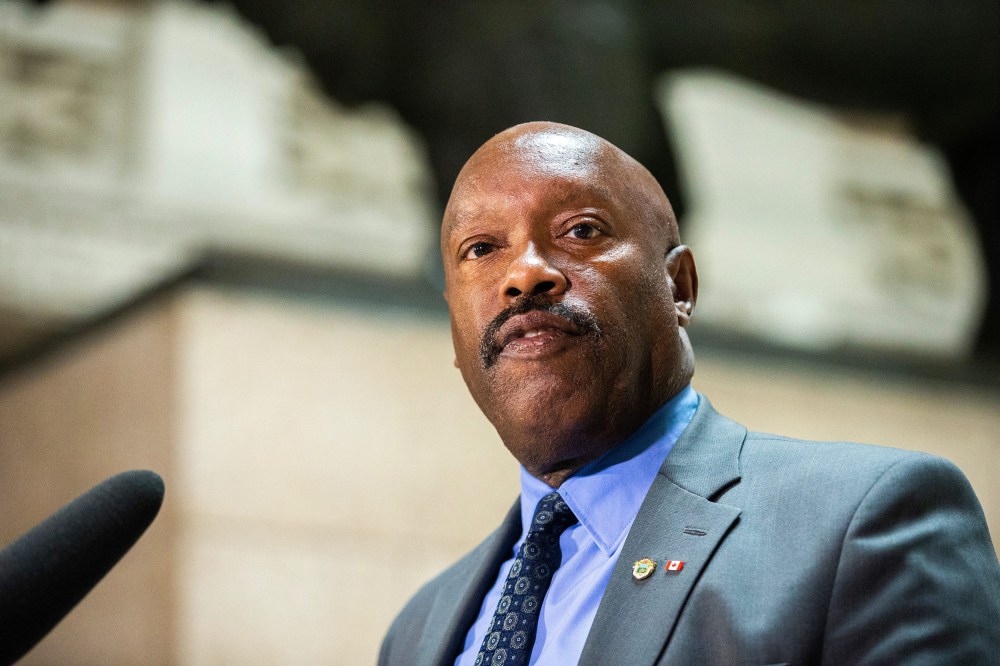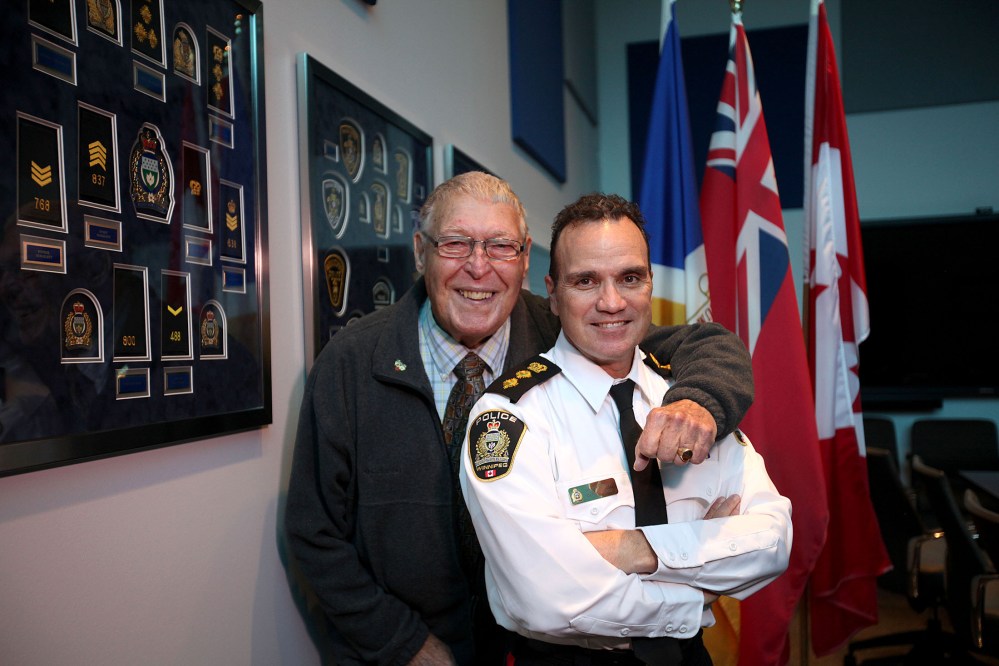
Winnipeg’s retiring police chief said he has been scarred by the COVID-19 pandemic, the fatal shooting of George Floyd in Minneapolis in 2020 and the ensuing defund the police movement, and a “shifting media” landscape.
Danny Smyth, who took the top job in November 2016 and will officially retire Sept. 7, issued a message to the rank and file after speaking at his last Winnipeg Police Board meeting Friday.
In the memo titled “The Chief’s Countdown,” which was obtained by the Free Press, the departing official said it’s important he speak to them directly and not via the media.

“Like any chief of police, I have been tested with my share of challenges. Some have been faced by chiefs before; some are unique to the times that we are currently living,” Smyth wrote. “All have left a mark.”
But, he said, COVID-19, the defund the police movement, and what he called a “shifting media” have left scars.
Smyth said he is still coming to terms with the isolation and trauma of the pandemic and the impact that had.
“There was no playbook or training. As chief, I had to make decisions with incomplete and sometimes inaccurate information,” Smyth said. “I didn’t always get it right.”
He said he did not envision how the fatal police shooting of Floyd would result in protests and a movement to cut police budgets. The Minneapolis officer was later convicted of second-degree murder.
“I would never have predicted that the actions of a police officer in another country would have such a profound and negative impact on police throughout the world,” Smyth said.

Smyth said in the memo that he recognizes the importance of a free and independent press but is disillusioned that “identity politics has influenced some (but not all) of the media organizations that are relied upon for a balanced perspective on current events — especially events involving the police.”
He said he is not surprised the public’s trust in the media is at “an all-time low” and that it’s imperative police directly communicate with the public as a result. He also slammed the “toxicity of social media.”
Smyth said those issues, combined with the perception he and other police brass did not care about officers, seriously affected morale.
The chief frequently clashed with the former president of the police union, Maurice Sabourin.
As head of the Winnipeg Police Association, Sabourin took the chief to task over officer morale, staffing levels and violent crime. Sabourin retired in September 2022.
Neither Sabourin or current police union president Cory Wiles could be reached for comment.

“I would state that each one of those impacts were not unique to Winnipeg. Policing has changed in North America over the last 10 years and both citizens and the law enforcement community must work together to improve community safety,” Winnipeg Police Board chairman Coun. Markus Chambers said Sunday.
“The Winnipeg Police Board is committed to working collaboratively with community and stakeholders to finding the next chief of police that can envision new and continued partnerships that will help to increase trust and confidence in policing.”
Longtime award-winning local journalist Cecil Rosner, who last year published the book, Manipulating the Message: How Powerful Forces Shape the News, devoted an entire chapter to how police departments try to control the message.
That’s why Rosner said he was disappointed, but not surprised, that Smyth used one of his final messages to police officers and staff to take a shot at the media.
“It is unfortunate he sees the problem is the media,” he said. “The media isn’t the problem — we need even more vigorous media.
“Police departments historically, and to this day in Canada and the United States, want to control the narrative. They jump in to control the narrative, usually to exonerate officers. J.J. Harper saw the department try to establish the narrative and say their officers did nothing wrong.
“We need to hold police departments and other institutions accountable.”
“Police departments historically, and to this day in Canada and the United States, want to control the narrative. They jump in to control the narrative, usually to exonerate officers … We need to hold police departments and other institutions accountable.”– Cecil Rosner
In the memo, Smyth said it has taken time and efforts to address concerns raised by officers in a 2021 survey and working groups in 2022.
However, Smyth said, he thinks the internal Real Change-Real Difference project to address their concerns is making a difference and he looks forward to the addition of an in-house mental health clinician to the staff. Collaboration and co-operation have led to an expanded employee assistance program that’s been enshrined in the collective agreement, he pointed out.
The chief said it has been a privilege to be head of the police force and told officers to look after each other and the community.
“I take my place in our history that the next generation of leaders are ready to take up the torch. And the next generation of police officers are ready to take on the challenge of keeping the community safe,” Smyth said.
“It has been an honour to have served our community with all of you; it has been a great privilege to have served as your chief.
“Look after each other — look after our community.”

Smyth was hired in 1986, taking after his father, Stan Smyth, who had been a city police officer for 38 years. He was deputy chief of investigative services for about a year before becoming the top cop.
He had worked as an investigator in the vice and surveillance units, as well as the tactical and street crime units, before becoming superintendent of investigations in 2012.
At his last police board meeting, Smyth lobbied for more staff, saying the WPS has approximately 1,375 officers, compared with about 1,450 when he became chief.
He said there is a reliance on overtime, which is costly and not sustainable, and raised the risk of overworking rank-and-file members. He did not say how many additional officers are required, stressing that should be analyzed and discussed with Manitoba Justice and the police board.
The police board wants to know what qualities residents would like Smyth’s replacement to have.
The board plans to hold consultations on the matter this month.
Colleen Mayer, vice-chair of the police board, said a permanent chief could be in place by the end of summer or early fall.
— with files from Kevin Rollason

Erik Pindera
Reporter
Erik Pindera is a reporter for the Free Press, mostly focusing on crime and justice. The born-and-bred Winnipegger attended Red River College Polytechnic, wrote for the community newspaper in Kenora, Ont. and reported on television and radio in Winnipeg before joining the Free Press in 2020. Read more about Erik.
Every piece of reporting Erik produces is reviewed by an editing team before it is posted online or published in print — part of the Free Press‘s tradition, since 1872, of producing reliable independent journalism. Read more about Free Press’s history and mandate, and learn how our newsroom operates.
Our newsroom depends on a growing audience of readers to power our journalism. If you are not a paid reader, please consider becoming a subscriber.
Our newsroom depends on its audience of readers to power our journalism. Thank you for your support.


